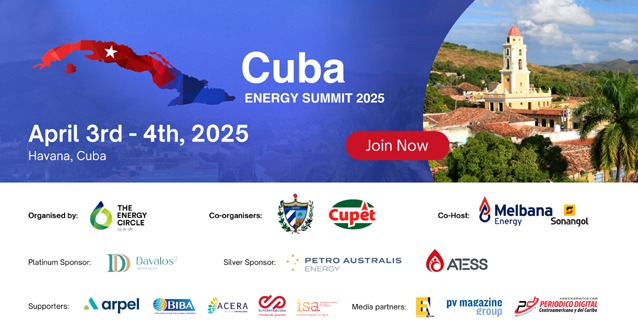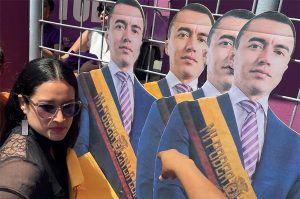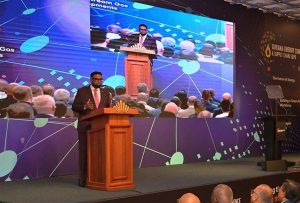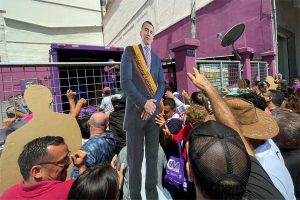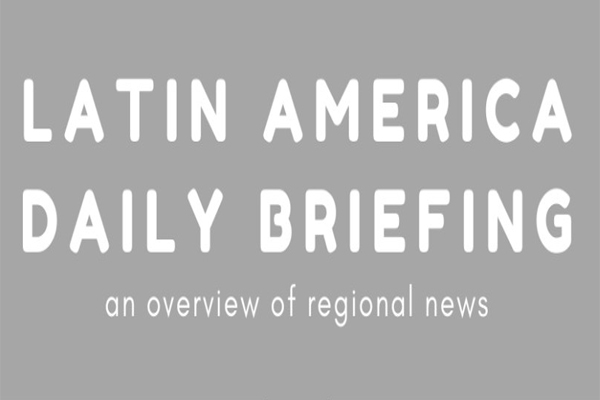
Leftist politician Gustavo Petro won the presidential nomination for the Pacto Histórico coalition Colombia’s primary elections yesterday. He won by a landslide within Pacto Histórico, which itself won the most votes yesterday, cementing Petro’s status as frontrunner ahead of the May presidential elections.
Petro obtained more than 4.5 million votes, within the 5.8 million cast for Pacto Histórico. While it is a record for the country’s primary votes, its far short of the estimated 10 million he would need to win outright in May. Most likely he will go to a runoff vote against the second-place candidate. (La Silla Vacía)
Centrist Sergio Fajardo won the nomination for the centrist Coalición de la Esperanza — but the coalition’s poor showing of 2.3 million votes adds to pessimism about a viable middle-ground option for Colombia’s presidency, notes the Latin America Risk Report.
Right-winger Federico Gutiérrez will run for Equipo de Colombia, which obtained nearly 2 million votes, stronger than expected, reports El Páis.
Yesterday’s primaries and legislative votes show a country that has swung to the left, reports Silla Vacía. Pacto Histórico was the most voted party in the country, for both the Senate and the Lower Chamber, though it fell short of obtaining majority. It will be the first time a leftist coalition is among the strongest groups in Congress, in Colombia, reports El País.
Nonetheless, the next president will face a fractured Congress, a challenge for the winner’s legislative agenda, according to the Latin America Risk Report. Centrist Coalición de la Esperanza obtained about 14 Senate seats, making it the fourth largest grouping in Congress, reports La Silla Vacía.
Also, for the first time, regions most affected by the country’s armed conflict selected victims to occupy special seats reserved in the Chamber of Representatives.
Nicaragua convicts Chamorro siblings
Nicaraguan activist Cristiana Chamorro, a prominent opponent of President Daniel Ortega, has been found guilty of money-laundering and other charges, along with her brother, former lawmaker Pedro Joaquín Chamorro and three former employees of the Fundación Violeta Barrios Chamorro, which focuses on freedom of speech.
The convictions are part of a broad crackdown against political opponents and critics that put Ortega’s challengers behind bars last year. Cristiana Chamorro faces up to 13 years in jail. Pedro Joaquín Chamorro, faces nine years in jail. In recent weeks Nicaragua’s judicial system has convicted more than 30 opposition activists, many charged with treason, doubling down on the crackdown following Ortega’s sham reelection in November. (Washington Post, Confidencial)
Human rights groups, as well as U.S. and Costa Rican officials emphasized the sham nature of the judicial proceedings, which they say are aimed at quashing dissent against the Ortega-Murillo government. (Confidencial)
The judge ignored 1,000 pages of evidence presented by the defense of the Chamorro’s and former employees of Violeta Barrios Chamorro Foundation, writes their brother and prominent exiled journalist Carlos F. Chamorro in Confidencial.
News Briefs
Regional Relations
- An Argentine judge ordered the detention of Venezuelan PSUV stalwart, Diosdado Cabello. The order would apply if Cabello enters Argentina, and responds to a United States detention order in relation to drug trafficking charges. (EFE) The judicial order responds to rumors that Cabello could enter Argentina through the country’s northern Jujuy province, on the border with Bolivia. (Infobae)
- The U.S. Biden administration has faced a significant domestic political backlash in response to its efforts to ease oil sanctions against Venezuela, reports the Wall Street Journal. In addition to replacing Russian crude now affected by U.S. sanctions, the White House also sees an opportunity to reduce Russian influence in Venezuela and aid negotiations between President Nicolás Maduro and the political opposition, reports the Wall Street Journal. (See last Wednesday’s post.)
Venezuela
- Venezuela’s oil output could rise by at least 400,000 barrels per day if the United States authorizes requests by state-run PDVSA’s partners to trade Venezuelan crude, the country’s petroleum chamber said on Friday. (Reuters)
Brazil
- Brazilian corn exports are expected to increase in response to Russia’s war on Ukraine, but it is unclear whether the benefit will outweigh the hit to Brazil’s crucial fertilizer imports, reports AFP. The fertilizer issue got swept up in a politically loaded debate last week when President Jair Bolsonaro called the Russia-Ukraine war an “opportunity” to pass a controversial bill to legalize mining on indigenous reservations. (See last Thursday’s briefs, and last Wednesday’s.)
El Salvador
- A court in El Salvador ordered the capture of former President Alfredo Cristiani in relation to the 1989 massacre of six Jesuit priests and two others by soldiers. Prosecutors allege that Cristiani knew of the military’s plan to eliminate the priests and did nothing to stop them, reports the Associated Press.
Mexico
- Mexican President Andres Manuel Lopez Obrador lashed out at EU lawmakers who urged his government to protect journalists and accused him of intimidating the press, branding their statement slanderous, reports AFP. (See Friday’s briefs.)
- Rising sea levels and fierce storms threaten Mexico’s Quintana Roo state’s coastline, and with it the ribbon of beach resorts and timeshares between Cancún and Tulum, reports the Guardian.
- A book by Cristina Rivera Garza tells the story of her sister’s unsolved femicide, 30 years after it happened. She said the memoir, which reconstructs the events and relationships that preceded her sister’s murder, was “written from a wound that I share with so many other families in Mexico, Latin America, and around the world.” — New York Times
Bermuda
- British judges have ruled that Bermuda’s ban on same-sex marriage is permitted under its constitution, in a setback for gay rights in the British overseas territory, reports the Guardian.
Cayman Islands
- The UK’s judicial committee of the privy council (JCPC) – the ultimate court of appeal for Bermuda and dozens of other British overseas territories, dependencies and Commonwealth states, also ruled separately that there was no right to same-sex marriage under the constitution of the Cayman Islands, reports the Guardian.
Haiti
- Conventional seismometers were not functioning in Haiti last August when a magnitude-7.2 earthquake struck the country’s south. But several small, inexpensive instruments run by citizen scientists managed to capture the seismic waves, giving researchers information fast, reports the New York Times.
Chile
- On his first day in office, Chilean President Gabriel Boric broke new ground by participating in a ceremony with Indigenous peoples at the presidential palace before attending mass in Santiago’s cathedral, reports AFP. (See Friday’s post.)
Latin America Daily Briefing
—
http://latinamericadailybriefing.blogspot.com
—

